Many CO₂e methodologies adhere to the standard calculation procedure.
We take it a step further.
Our proprietary routing algorithms and vast amount of data help us surpass standard methodologies, enabling optimal route search and accurate carbon emissions.
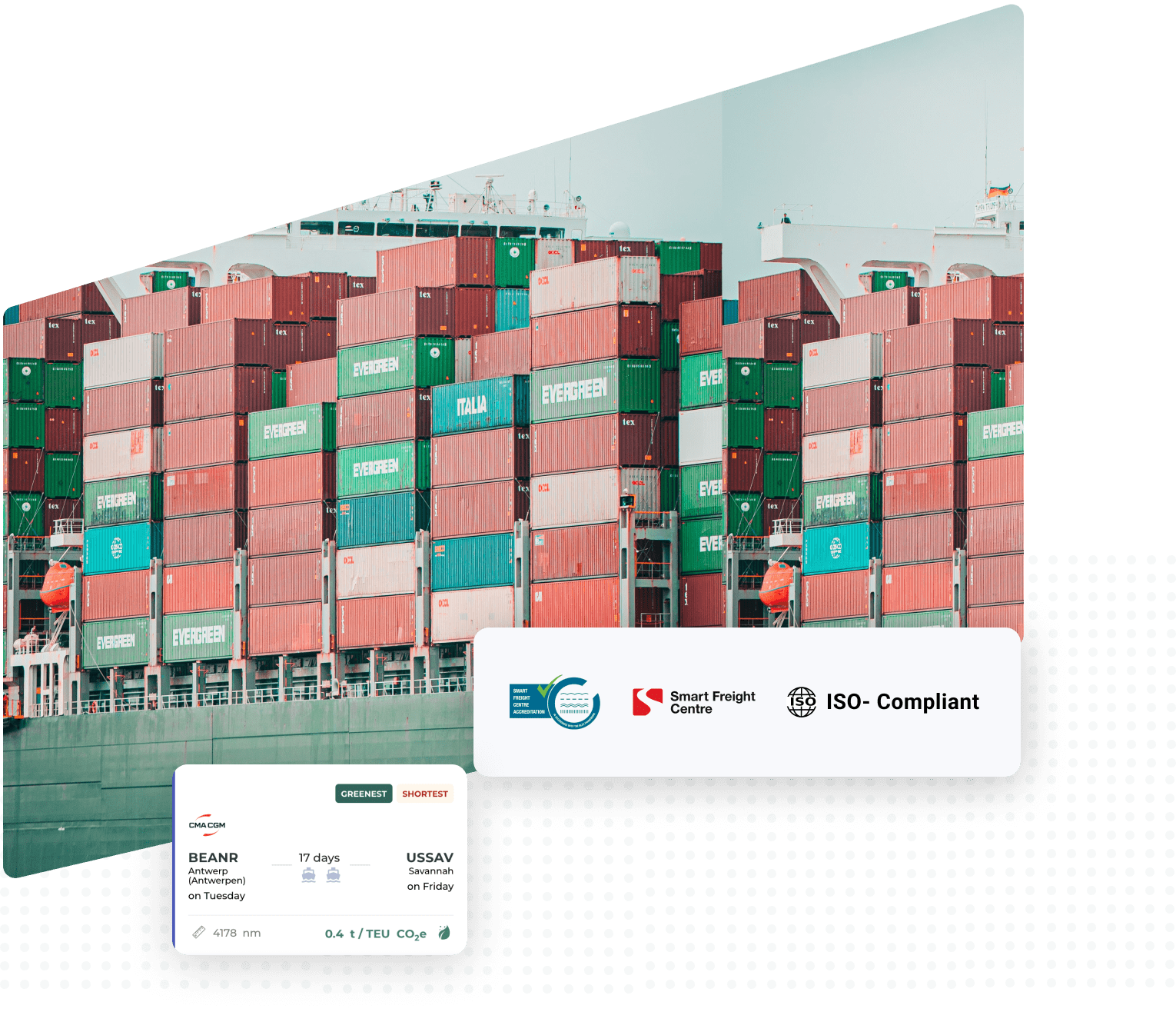
“Proudly recognized as the most accurate carbon emission solution in the market”*
*Drewry report
Navigating carbon emissions with
Our unique formula for reliable calculations

Granularity of data
At Searoutes, data intelligence is at the core of what we do, and that is why we take pride in our algorithms, which rely on a robust database of historical AIS data. These algorithms are further enhanced with data inputs from +6k vessels, their technical information, carrier schedules, among others.

Scientific approach
Our engineering team continuously calibrates and fine-tune our models against reliable primary data. If your models don’t add up to existing primary data, we will make them evolve. This ongoing calibration ensures accuracy and transparency.

Routing optimization on the network
We give you valuable insights to minimize carbon footprint while optimizing operational and procurement efficiency. It also helps us to fill in the blanks of incomplete data with a business-savvy approach, allowing you to get the most accurate emissions insights your data can get.
Evaluate data outputs with
Dynamic API results based on your inputs
The information you can provide are a crucial part of our CO₂e calculation models. Our ability to enhance data modeling depends also on your data inputs. To offer you the utmost accuracy in your carbon emissions, our methodology and powerful algorithms include:
- Terrestrial and Satellite AIS data
- Extensive base of carriers schedules
- Vessels technical and operational information
- Information on traffic separation schemes, piracy areas, and port entries
- Fuel type analysis, including emission control areas at sea (ECA/SECA)
-
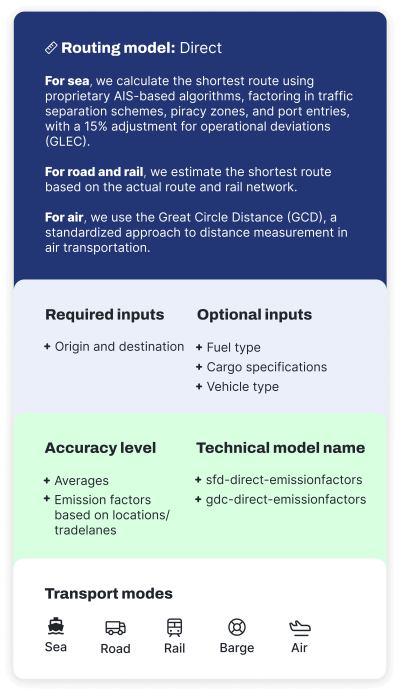 Turning minimal data into great insights
Turning minimal data into great insightsFactors Models
Leveraging the latest GLEC and ISO standards, this model precisely computes carbon emissions for all transport modes.
Elements considered:
- Shortest feasible distance
- Emission factors per tradelanes
- Cargo characteristics (size, weight, dry or reefer, etc.)
- Fuel types (and fuel switch for emissions control areas at sea)
- Vehicule type (air, road and barge)
- For air: GLEC emission factors based on the length (short, medium, long haul) of the flight and the aircraft type (passenger, cargo or unknown)
-
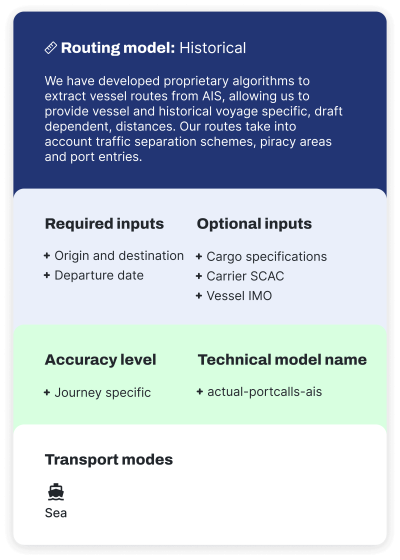 Navigate historical AIS data for journey-specific CO2 reporting
Navigate historical AIS data for journey-specific CO2 reportingHistorical Model
Powered by historical AIS data, this model rebuilds vessel itineraries and calculates CO₂e emissions for past shipments at vessel, carrier, or industry levels.
Missing shipment details? No problem. We combine your data with ours to estimate likely routes and vessels, delivering precise CO₂ insights.Elements considered:
- Actual distances
- Port calls operated at a specific date for each vessel
- Connecting vessels
- Cargo characteristics
- The fuel consumption model considers the vessel’s engine characteristics, fuel types, fuel switching in emissions control areas, and vessel characteristics for emissions allocation
-
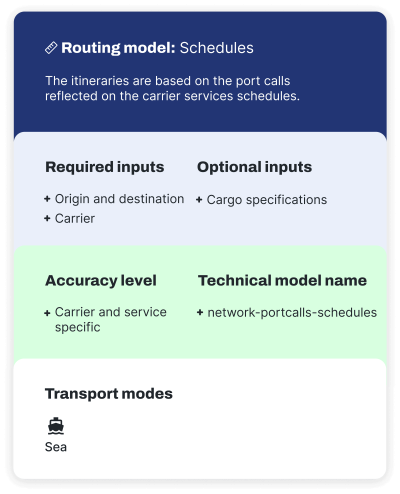 Ship smarter, ship greener: perceptive insights for planning strategy
Ship smarter, ship greener: perceptive insights for planning strategySchedules Model
Built to empower shippers with data-driven carrier choices, this model calculates carrier-operated itineraries, including alliance services.
For each itinerary, we compute CO₂e emissions of the vessels in service, providing comprehensive emission statistics.Elements considered:
- Network distances
- Cargo characteristics
- The fuel consumption model considers the vessel’s engine characteristics, fuel types, fuel switching in emissions control areas, and vessel characteristics for emissions allocation
-
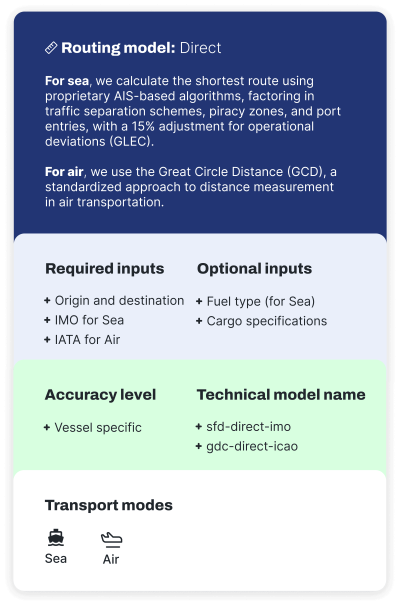 Get spot-on CO2e emissions with ship-specific data
Get spot-on CO2e emissions with ship-specific dataVessel and Aircraft Models
This solution returns CO₂e emissions between two locations, taking into account the exact characteristics of the requested ship to model its fuel consumption.
Elements considered:
- Shortest feasible distance
- Cargo characteristics
- For sea, fuel consumption model considers the characteristics of the vessel, fuel types, and fuel switch for emissions control areas.
- For air, fuel consumption model considers take-off, landing, climbing, descent and cruising phases, and the aircraft characteristics for the allocation of the emissions (EEA/EMEP methodology and EUROCONTROL data).
-
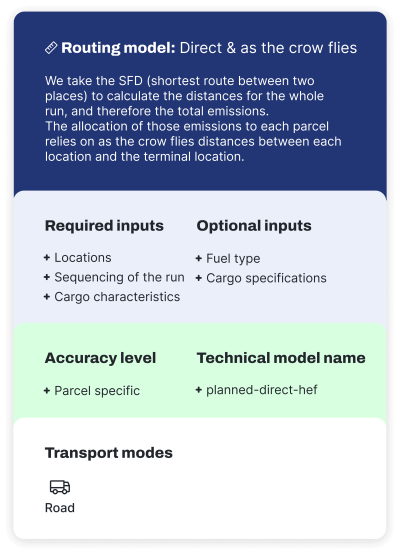 Sharing is caring: minimize carbon footprint, maximize logistics efficiency
Sharing is caring: minimize carbon footprint, maximize logistics efficiencyParcel Model
Designed for milk run operations, it computes and assigns the right emissions to each order (parcel) of a pickup and delivery collection by road.
This model, based on the HBEFA (handbook emission factors for road transport data), takes into account empty running distances along with load factor between each pickup/delivery location.
Elements considered:
- Shortest feasible distance between each location
- As the crow flies distances between each location and the terminal location
- Sequencing of the run
- Cargo characteristics
- Fuel type
To dig deeper in the understanding of our methodology, explore our API documentation.
Obtain a detailed certificate to acknowledge and communicate on one or multiple shipments emissions.
 Analyze your carbon emission sources and plan optimal strategies for a sustainable transformation
Analyze your carbon emission sources and plan optimal strategies for a sustainable transformation
Identify where your biggest emissions are coming from and which initiatives should be implemented.
 Evaluate the impact of your choices
Evaluate the impact of your choices
Carbon emission awareness to acknowledge how much are you currently emitting.
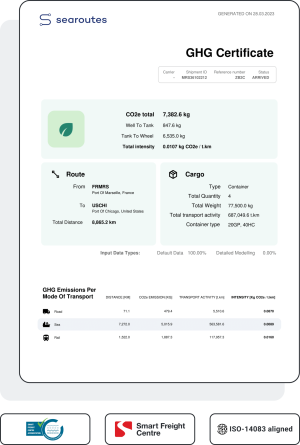
Optimizing for low carbon routes
Our planner helps you make data-driven decisions and identify the greenest carrier solutions
Our planner identifies the greenest, fastest and most reliable ocean carriers solutions, helping you make the best strategic and operational decisions to comply with your procurement and sustainability goals. Incorporating our CO₂eplanner into your tendering process opens up numerous possibilities to:
Evaluate the choices, considering the balance between sustainability, reliability and transit times.
Discover greener routes and options to minimize your carbon footprint.
Strategically allocate your shipment volumes to the most suitable carriers for your sustainability goals.
Reduce the need for investments in insetting and offsetting.
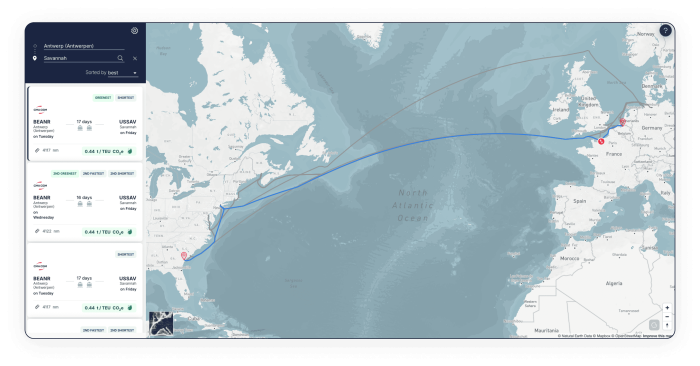
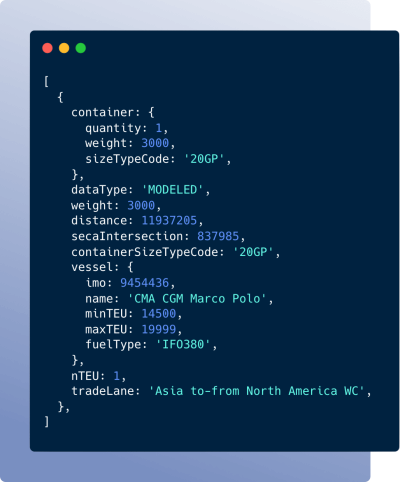
An API-first approach to a more efficient supply chain
Searoutes makes it easy for any company to use carbon emission data.
Our API-first architecture enables you to enhance your systems with added value, facilitating precise emissions measurement and efficient reporting.
![]() Our APIs integrate seamlessly in the systems used by carriers, freight forwarders, shippers and solution providers.
Our APIs integrate seamlessly in the systems used by carriers, freight forwarders, shippers and solution providers.
![]() Accelerate your ability to further develop added value for your customers with reliable CO₂e emissions data.
Accelerate your ability to further develop added value for your customers with reliable CO₂e emissions data.
![]() Easily match our API with your specific needs and scale your operations as your business grows.
Easily match our API with your specific needs and scale your operations as your business grows.
![]() Our remarkable 99.9% uptime guarantees uninterrupted and smooth operation of your platform.
Our remarkable 99.9% uptime guarantees uninterrupted and smooth operation of your platform.
https://status.searoutes.com/
![]() Process multiple shipments via CSV.
Process multiple shipments via CSV.
What our customers say
“Through our collaboration with Searoutes, we have reached a significant milestone in crafting the inaugural Greenhouse Gas Certificate, which incorporates precise emissions’ data across all modes of transportation. As one of the pioneering freight forwarders, we take great pride in offering our customers comprehensive CO₂e footprint information and tailor-made solutions.”
Jan-Kenrik Hertel
Process and Operations Director of Andes Logística
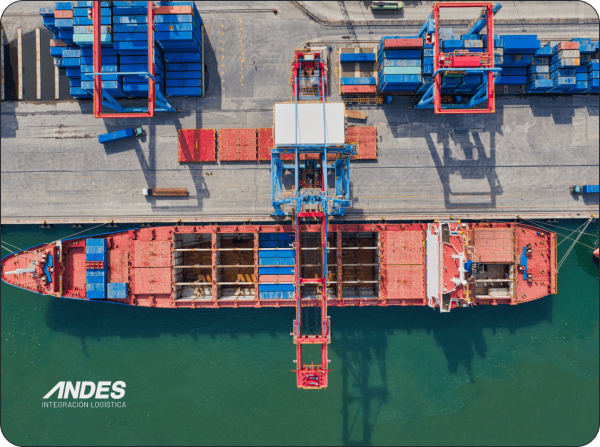
70% of our main export customers
Now consider environmental care a critical aspect for the upcoming year.
Andes improved the granularity of their data
On Distance, CO₂e, Intensity, Well-To-Tank, Tank-To-Wheel.